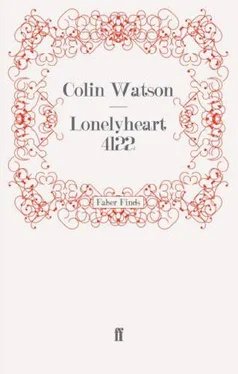His third sortie was successful. As he hunched thankfully in the dry, leather-smelling gloom, he caught a glimpse of the river over which the cab was carrying him, and groaned. It made him think, for a moment mercifully brief, of what the sea was in all probability like.
And now here he was, he supposed, in Twickenham. He watched the passing scene. It might have been Acton, or Streatham, or Balham, or Reading. Or anywhere. What did names mean here? Why did people still pretend that there were individual oats in this great bowl of porridge?
But when he got out of the taxi and saw the deserted, gently curved street of Georgian houses, each with a little railed garden into which raindrops splashed from the boughs of old, imperturbable sycamores, he had to admit that homogeneity was not yet absolute even in Middlesex.
He found number eight The Turnills half way down the right-handed terrace—the taxi had been unable to enter the street because of three bulbous iron posts set across the carriageway at its upper end.
His knock was answered by a slim, fair-haired girl of eleven or so, whose glasses gave her small, fastidious-looking face an attractive air of solitude.
“How do you do?” she inquired of him, seemingly anxious to gain a truthful reply.
“Good afternoon,” said the commander, with a big is-your-mother-in smile. “Do some people called Cambridge live in this house?”
“Yes, they do,” said the girl. (A neighbour’s child, perhaps? A runner of errands?)
He peered down amiably. “I should rather like to speak to them. To Miss Cambridge, that is.”
“I am Miss Cambridge.”
The commander laughed. “No, no. Miss Evelyn Cambridge, I mean.”
“But that’s me. I’m Evelyn. What is your name, please?”
“Well, fancy that...No, I’m afraid I haven’t made myself very clear. My name is Commander Trelawney and I wish to speak to the other Miss Cambridge—the lady who is the daughter of old Mr Cambridge.”
The girl considered this, her natural politeness prompting her to attempt some interpretation that would satisfy the visitor. The best she could muster was: “I don’t think Grandad had a daughter called Evelyn, but I’ll ask Daddy if you like.”
“Daddy?”
“Yes. He’s called Mr Cambridge, as well.”
“Ah...well, perhaps if I were to have a word with him...”
The girl turned, then looked back at Trelawney apologetically and pulled the door fully open. “I should have asked you to come in, shouldn’t I?”
“That is most kind of you, my dear.” He stepped forward and stood within the doorway.
After giving him a careful glance, as if to make sure that he fitted properly and would not fall over when left alone, she trotted off down the corridor and disappeared round a corner at the end.
The commander stuck his hands in his pockets and stood frowning out at the rain. He told himself that the apparent surplus of Cambridges was nothing to worry about. The child, no relation at all but simply avid for security and affection, was doubtless identifying herself with Lucy Teatime’s friend. “Daddy” would prove to be another dream figure—an imaginary father whom she pretended to consult when difficulties cropped up. Poor child. At any moment now, the real Miss Cambridge would come out and...
He turned, having heard a gentle scuffling noise. Also he was vaguely aware of being watched.
He peered along the corridor. As his eyes grew accustomed to the dimness, he discerned a number of small figures. They were ranged, apparently in some order of seniority, in a shadowy doorway and were gazing at him with dark, serious eyes. They reminded him for an instant of an unpacked nest of Japanese dolls, the sort that fit one inside another. But before he could begin to count them, they flitted away out of sight.
The commander’s frown deepened. There was something very odd about all this. Why had Lucy not mentioned that the house would be full of children? Were they old Mr Cambridge’s? A hobby, perhaps, that had finally landed him in his present financial predicament. Into hospital, too. Yet surely the brood didn’t belong to his daughter? The straight-laced Lucy was hardly likely to have fostered the friendship of an unmarried mother—least of all one whose irregular habits were of such patent regularity...
His anxious musing was brought to an end by the appearance of a man of pleasant aspect and with much the same expression of bespectacled helpfulness as the girl.
The man greeted him affably. His voice resembled that of a don, delighted to discover at his door a colleague bearing port.
“My name is Cambridge,” said the man.
To Trelawney, the announcement sounded like some elaborate pun. He felt by now thoroughly bewildered.
“Come along in,” said Mr Cambridge, leading him through a door on the right into a large, warm room that seemed at first sight to be a musical instrument museum; He waved him to a chair.
“My daughter says that you are Commander Trelawney.”
The commander nodded. He said, a little falteringly: “I’m very glad to see you’re...out of hospital again.”
“Hospital?”
“Haven’t you been in hospital?*
“Not for some years, no.”
“Oh...I’m sorry—I must have misunderstood. Anyway, you’re looking very fit. I’m glad.”
Mr Cambridge gave a little bow. His face remained calm. Wasn’t he bearing bankruptcy rather too well?
“I have come about the boat,” announced the commander.
There was a short silence,
“But I don’t think we want a boat,” Mr Cambridge said. He looked at the door and added: “I’ll ask my wife, if you like.”
Trelawney tried not to believe that a horde of impostors had taken advantage of the removal of the real Mr Cambridge to hospital and seized his house.
“I am not selling boats,” he said. “I am here to buy yours.” He reached in his pocket for the letter. “On behalf of its original owner.”
“A boat,” Mr Cambridge repeated thoughtfully. He looked up. “You’re sure you don’t mean a cello?”
Trelawney stared wildly.
Mr Cambridge stepped to a corner of the room where there was, indeed, a great fat stringed instrument. He stroked it fondly. “Edwin can’t really manage it, you know, and Estella’s got her hands full with a harp at the moment. I don’t like to see it go, but...”
Trelawney cut him short by leaping tip and thrusting the letter into his hand.
Mr Cambridge looked at it. “But this is addressed to Evelyn. She’s the one who let you in, you know.”
“Read it.”
Mr Cambridge slit open the envelope.
“How very odd,” he said, three minutes later.
Trelawney took back the letter and put it in his pocket. He continued to regard Mr Cambridge in grim silence.
“There obviously has been some misunderstanding, Mr Trelawney. To me, that letter is quite incomprehensible. I’m awfully sorry.”
“Then you don’t know this...this woman?”
“I have never even heard of her.”
Trelawney nodded. He looked very angry indeed.
When he had gone, Mr Cambridge sorted among the children until he found Evelyn, whom he led by the hand into the room with all the musical instruments.
“Tell me, Evelyn,” he said, “do you know a lady called Miss Lucilla Teatime?”
“Yes,” said Evelyn.
“And who is she?”
“I don’t know who she is, but I can tell you where she used to live.”
“All right.”
“Three doors up, on the other side. She was very nice.”
“But is she there now?”
“Not now. She went away. She said she was going to get married to Mr Jackman. He keeps that jeweller’s next to the paper shop at the top.”
“I see.”
Читать дальше












